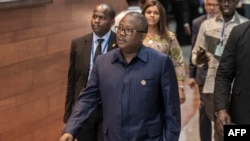Mali's military government has lashed out at the Economic Community of West African States’ chairman for calling an April massacre in neighboring Burkina Faso part of a genocide.
Burkina Faso’s military leader has said militants who stole military equipment could be responsible.
In a statement Thursday on Mali’s state TV, ORTM, the government rejected the West African bloc’s chairman’s calling civilian killings “genocide.”
Umaro Sissoco Embalo, who is also president of Guinea Bissau, used the term in a tweet April 27 in which he condemned the April 20 mass killing of more than 100 civilians, allegedly by Burkina Faso’s army.
The Economic Community of West African States (ECOWAS) released a statement the same day stating that targeting civilians can be characterized as genocide by the International Criminal Court.
An ORTM presenter read the Malian military government’s response. The statement said the ECOWAS chairman’s statements qualified the incident as genocide without any proof and that Embalo had imposed his will on the commission.
The government’s statement went on to say the accusations against Burkina Faso’s army reminded it of what it called, “desperate attempts to exploit human rights in order to accuse the authorities” in Mali.
More than 100 civilians were killed in the massacre in Karma, Burkina Faso, with survivors in an April 29 televised briefing blaming the army for the attack.
Human Rights Watch said 156 people were killed in the massacre.
Burkina Faso’s military leader Captain Ibrahim Traore pointed the finger Thursday at the Islamist militants they’ve been fighting. He told state television RTB militants had seized military equipment and carried out attacks.
In the televised report, Traore said the defense and security forces should not be immediately accused and that waiting on the results of an investigation was necessary.
Traore questioned the motive of accusations against the defense and security forces, and said it might be an effort to damage their morale.
Traore complained that many countries refuse to sell Burkina Faso weapons to fight the militants, so the country has had to turn to countries like Russia.
But, he said, his country has many allies. He included France, which has an embassy there though its army had left the country. Burkina Faso also has strategic allies, Traore said, and described Russia as one.
Rights groups have accused Mali’s army of killing civilians, including working with Russia’s Wagner Group mercenaries.
In April 2022, several media outlets as well as Human Rights Watch reported a massacre of 300 civilians in central Mali, allegedly by Wagner and Malian troops.
Mali’s military denied the allegation, and said it works with Russian “instructors,” and that it killed more than 200 “terrorists” in the incident.
Critics have raised concerns that Burkina Faso may also turn to the Wagner Group, which has been accused of rights abuses in other countries, including the Central African Republic and Russia’s war in Ukraine.
Mali’s military has ruled since a 2020 coup. Burkina Faso’s military seized control of the government in 2022.
Burkina Faso’s prime minister, in a visit to Mali in February, suggested the two countries form a federation to boost their economic power.
Tensions between ECOWAS, Burkina Faso and Mali rose sharply due to the regional bloc’s sanctions over the coups and their delaying a return to elections.
Some sanctions were lifted after military leaders agreed to a transition period and timeline for elections.
But individual sanctions remain against members of the military. Both Burkina Faso and Mali, along with Guinea, which had a coup in 2021, are suspended from ECOWAS and the African Union until the return of constitutional rule.
Mali’s military government announced Friday it would hold a referendum on a new constitution June 18, one of the steps toward elections next year.
This report includes information from Agence France-Presse.






